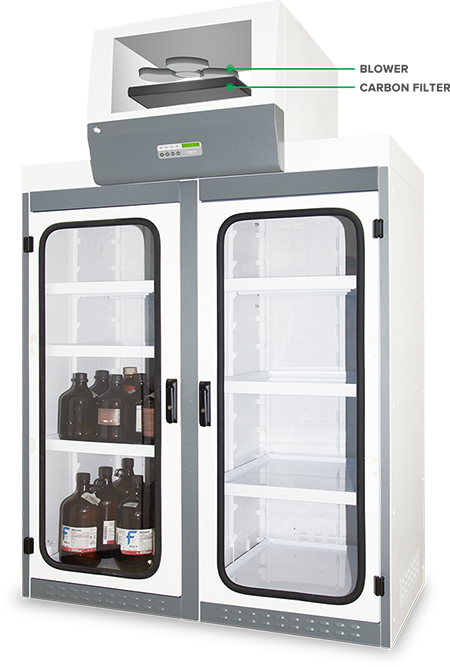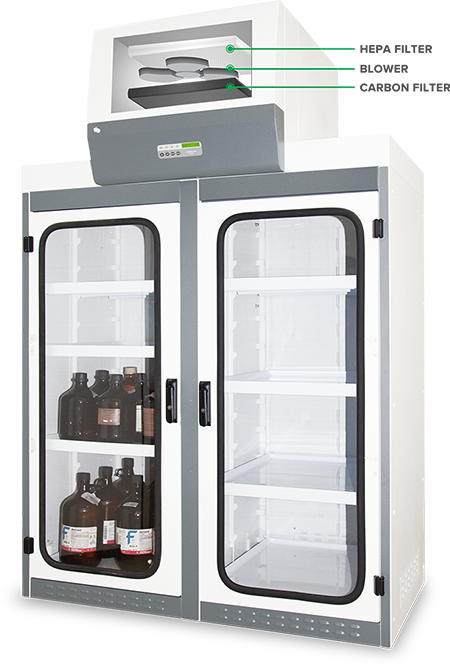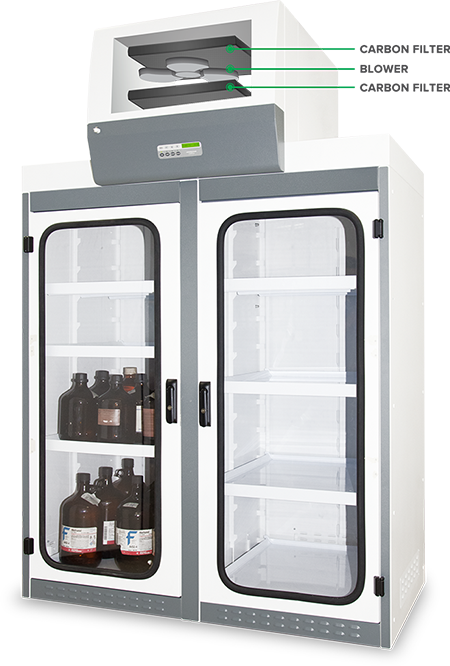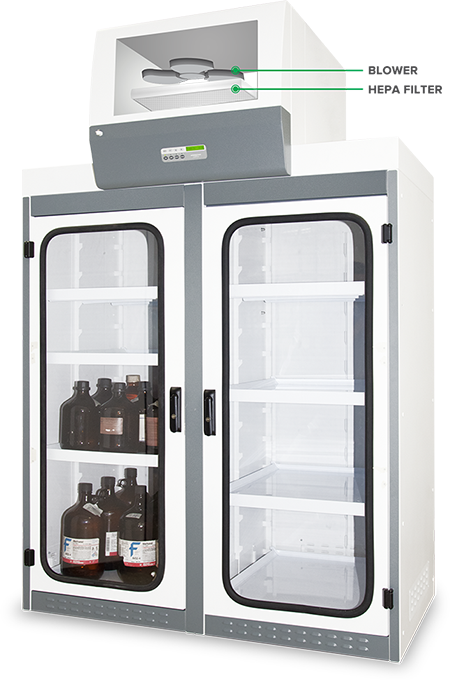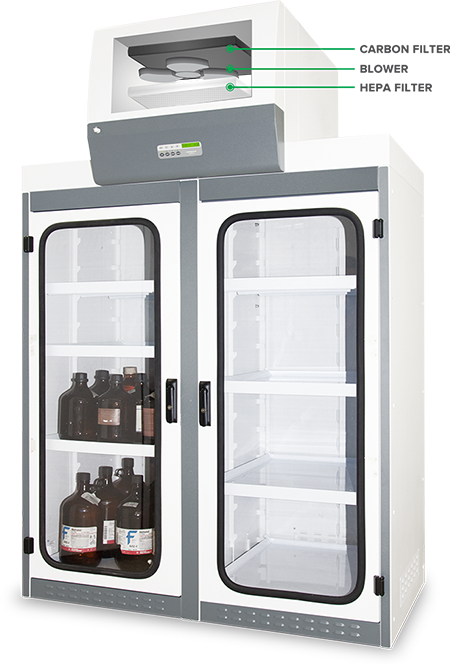Fumes from chemical containers often result in the storage cabinet’s corrosion and contaminated air in the laboratory. A filtered storage cabinet is equipped with carbon and HEPA filters that remove toxic chemical fumes and particles to provide operator and environment protection.
Must-have features to consider:
- VOC sensor that provides audible and visual alarms to alert users for filter saturation
- User-friendly control system interface for hassle-free operation
- Durable and chemical-resistant polypropylene trays
- Large tray capacity to accommodate more chemical bottles with different weights
- Multiple filter configurations compatible for a wide range of chemical storing
- Industrial grade main body constructed from E.G. Steel with Isocide™ powder coating
- Acrylic Glass doors with alarms to notify if doors are left opened.
- FiltraCheck™ free service to qualify your application's suitability for a ductless solution

Fumes from chemical containers often result in the storage cabinet’s corrosion and contaminated air in the laboratory. Ascent™ storage cabinet (ASC) is ideal in providing a safe and convenient storage solution. The ASC-A series cabinet is equipped with Nanocarb™ filters that effectively adsorb chemical fumes to provide operator and environment protection.

Ascent™ Filtered Storage Cabinet - B Series (ASC-B) is equipped with a main carbon filter and a secondary HEPA filter. This model is ideal for laboratories handling a variety of chemicals in both granulated and solution form. ASC-B filtered storage cabinet improves lab safety and prevents chemical exposure in cases of spillage during storage.

Ascent™ Filtered Storage Cabinet - C Series (ASC-C) is equipped with two carbon filters that offers dual protection and ideal for storing a broad range of chemicals. This model is ideal for laboratories handling acids, bases, and solvents as it offers a safe and corrosion-free chemical storage.

Ascent™ Filtered Storage Cabinet - D Series (ASC-D) is ideal for storing chemicals in powdered form or in granulated formula as it is equipped with a HEPA filtration system.

Ascent™ filtered storage cabinet E Series (ASC-E) is suitable for laboratories storing large amount of solid chemicals and solvents. This filtered storage cabinet is equipped with a main HEPA filter for removal of chemical granules or particles and has a secondary carbon filter for removal of toxic fumes generated from the chemical bottles.
Ascent™ Storage Cabinet –A Series
Specifications:
- Standard model
- Has a main carbon filter
- VOC Sensor
- PP Trays
- Available in 2,4,6 ft.
Ascent™ Storage Cabinet –B Series
Specifications:
- Has a main carbon filter
- Has secondary HEPA filter
- PP trays
- VOC Sensor
- Available in 2,4,6 ft.
Ascent™ Storage Cabinet –C Series
Specifications:
- Has a main carbon filter
- Has a secondary carbon filter
- VOC Sensor
- PP Trays
- Available in 2,4,6 ft.
Ascent™ Storage Cabinet –D Series
Specifications:
- Has a main HEPA filter
- PP trays
- VOC Sensor
- Available in 2,4,6 ft.
Ascent™ Storage Cabinet –E Series
Specifications:
- Has main HEPA filter
- Has secondary carbon filter
- PP trays
- VOC Sensor
- Available in 2,4,6 ft.
- 4 trays for 2L bottles
- 3 trays for 4L bottles
- 6 trays for smaller bottles
ASC storage cabinet does not maintain an airflow velocity. The blower is set to run at 35% to maintain a zero negative pressure inside the cabinet. Once the pressure drop increases, this indicates that the filter is already saturated, sending signal to the blower to increase the speed or to alert the user to change the
filter. Airflow volume is maintained at 140 cfm.
- Door alarm – if doors are left opened
- Filter Saturation alarm – VOC Sensor is installed
Polypropylene
Yes. Additional Polypropylene Tray 1 Set = 2 Trays:
- For 2 ft model – 1 set
- For 4 ft model – 2 sets
- For 6 ft model – 3 sets
Room air enters the cabinet through the 5mm gap around the door and through the 10mm single line
perforation on its bottom with the help of the blower and then filtered air is exhausted back to the room.
Ascent™ Max Storage Cabinet equipped with a VOC sensor. This sensor activates audio-visual alarms when the carbon filter is nearing saturation. Gas detectors such as Draeger Accuro pump or RAE meter are also recommended. These apparatuses are placed above the exhaust flow to test the concentration of the gases/chemicals present. The actual ppm is checked against the OSHA guideline for PEL (Permissible Exposure Limit). If it’s still comfortably below the limit, the carbon filter is still effective.
The lifespan of a carbon filter is influenced by its application, environmental conditions, and exposure to chemicals. These factors can impact the filter's performance. To maintain optimal conditions in your storage cabinet, pay attention to changes in odor, air quality, and any alerts from the VOC sensor.
The carbon filter is made of special activated carbon, also known as activated charcoal. Derived from various carbon-rich sources, it's further enhanced with activating agents to boost its adsorption capabilities.
